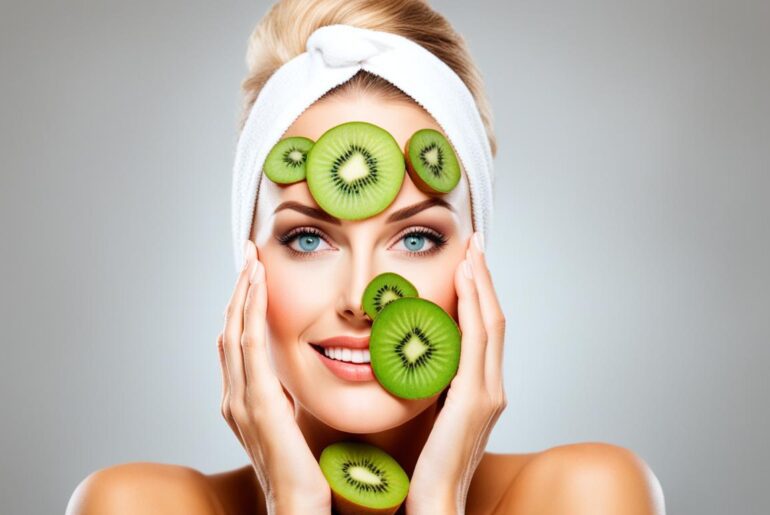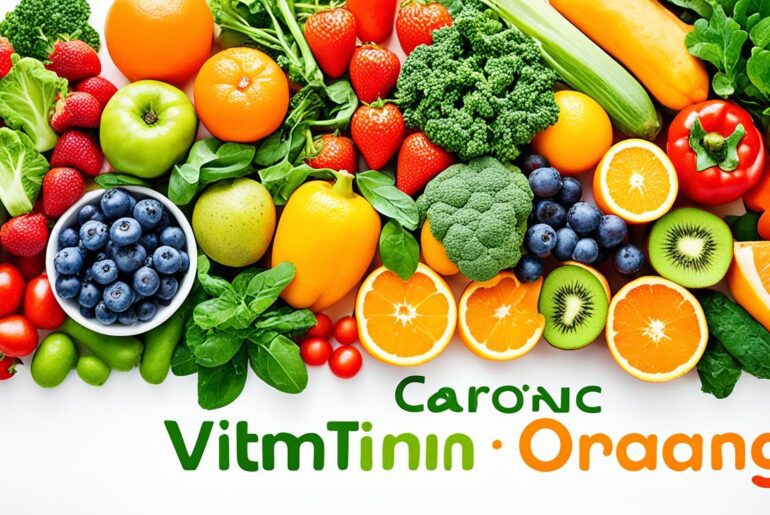Taking care of your skin is important for overall health, and vitamins play a crucial role in maintaining skin health. But with so many options out there, how do you know which vitamins are the best for your skin?
In this article, we will explore the top essential vitamins for skin health, their benefits, and how to incorporate them into your skincare routine. From reducing dark spots to preventing wrinkles, these vitamins have the power to transform and nourish your skin.
So, are you ready to discover the best essential vitamins for glowing, healthy skin? Let’s dive in!
Key Takeaways:
- The best essential vitamins for skin health include vitamin D, vitamin C, vitamin E, and vitamin K.
- Vitamin D is crucial for skin tone and may even help in treating skin conditions like psoriasis.
- Vitamin C plays a vital role in collagen production and protecting the skin from UV damage.
- Vitamin E is an antioxidant that helps keep the skin conditioned and prevents dryness.
- Vitamin K aids in the body’s blood clotting process and helps heal wounds and areas affected by surgery.
- Ensuring proper nutrition and considering vitamin supplements can help support overall skin health.
The Importance of Vitamin D for Skin Health
Vitamin D plays a crucial role in maintaining skin health and promoting overall well-being. It is not only essential for the skin’s appearance but also contributes to its functionality. Here, we will explore the benefits of vitamin D for skin, its sources, recommended intake, and the impact on overall skin health.
Vitamin D is essential for skin health as it plays a role in skin tone and may even help treat skin conditions like psoriasis.
The primary source of vitamin D is sunlight. When the skin absorbs sunlight, cholesterol in the body converts to vitamin D. Liver and kidneys then transport it throughout the body, ensuring its availability for various bodily functions, including skin health.
To increase vitamin D intake, individuals can benefit from getting at least 10 minutes of sun exposure each day. However, it is crucial to protect the skin from excessive sun exposure and use sunscreen to prevent any harmful effects.
Consuming fortified foods or foods naturally rich in vitamin D, such as salmon and tuna, can also help increase vitamin D levels in the body.
In addition to sunlight exposure, another way to obtain vitamin D is through the diet. Fortified foods like milk, orange juice, and cereals are often enriched with vitamin D. Fish, such as salmon, tuna, and mackerel, as well as cod liver oil, are excellent natural sources of vitamin D.
The recommended daily intake of vitamin D is 600 IU per day for most adults. However, it may vary depending on individual factors such as age and pregnancy status. Consulting with a healthcare professional can provide personalized recommendations for vitamin D intake.
| Vitamin D Sources | Recommended Daily Intake |
|---|---|
| Sunlight | At least 10 minutes of sun exposure |
| Fortified foods (milk, orange juice, cereals) | Varies; check product labels |
| Fatty fish (salmon, tuna, mackerel) | Varies; approximately 200-600 IU |
In conclusion, vitamin D is vital for skin health and can be obtained through sunlight exposure and a variety of dietary sources. Whether from sunlight or fortified foods, ensuring an adequate intake of vitamin D is essential for maintaining healthy and radiant skin. By incorporating vitamin D-rich foods into your diet and following recommended guidelines for sun exposure, you can optimize your skin’s well-being.
The Benefits of Vitamin C for Skin Health

Vitamin C is an essential nutrient that plays a significant role in maintaining the health of your skin. It is found in high levels in both the outer and inner layers of the skin, making it an integral part of your skincare routine. Incorporating vitamin C into your daily regimen can provide numerous benefits for your skin and overall well-being.
Protects Against UV Damage
Vitamin C acts as a powerful antioxidant, helping to neutralize free radicals and protect your skin from the harmful effects of UV radiation. This antioxidant property helps reduce the formation of sunburn cells, as well as reverse skin aging caused by prolonged sun exposure. By shielding your skin from UV damage, vitamin C can help prevent the development of wrinkles and fine lines, keeping your skin youthful and radiant.
Boosts Collagen Production
Collagen is a structural protein that provides strength and elasticity to your skin. Vitamin C plays a vital role in collagen synthesis, supporting the production of this essential protein. By stimulating collagen production, vitamin C can help improve skin texture, reduce the appearance of scars, and promote a firm and plump complexion. Incorporating vitamin C into your skincare routine can contribute to a more youthful and vibrant appearance.
Aids in Wound Healing
Vitamin C plays a crucial role in wound healing due to its involvement in collagen synthesis. It helps promote the production of new skin cells, making it beneficial for the healing of wounds, cuts, and abrasions. By accelerating the wound healing process, vitamin C can minimize scarring and support the overall health and integrity of your skin.
Repairs and Prevents Dry Skin
Dry skin can be uncomfortable and contribute to various skin concerns. Vitamin C helps repair and strengthen the skin’s natural moisture barrier, preventing excessive water loss and maintaining optimal hydration levels. By keeping your skin adequately moisturized, vitamin C can help prevent dryness and promote a smooth and supple complexion.
| Vitamin C Sources | Vitamin C Intake | Vitamin C Recommendations |
|---|---|---|
| Citrus fruits | 75-120 mg per day | Adequate intake of vitamin C is essential for skin health. The recommended daily intake for adults is 75-120 mg. However, individual needs may vary depending on factors such as age, overall health, and certain medical conditions. |
| Strawberries | ||
| Broccoli | ||
| Spinach |
To ensure adequate vitamin C intake, incorporate a variety of vitamin C-rich foods into your diet, such as citrus fruits (oranges, lemons), strawberries, broccoli, and spinach. These foods not only provide you with vitamin C but also offer other essential nutrients for overall health.
In addition to obtaining vitamin C from dietary sources, you can also consider taking vitamin C supplements. Consult with a healthcare professional to determine the most appropriate dosage for your specific needs and to ensure compatibility with any existing medications or medical conditions.
Remember, consistent and regular use of vitamin C can yield visible improvements in your skin health over time. So, nourish your skin from within by embracing the benefits of vitamin C and enjoy the radiant and healthy complexion you deserve.
The Role of Vitamin E in Skin Health
Vitamin E plays a vital role in maintaining healthy skin. As an antioxidant, it helps protect the skin from sun damage and keeps it conditioned, preventing dryness and promoting a youthful appearance. In addition to these benefits, vitamin E also plays a role in the treatment of skin inflammation.
Vitamin E is mainly produced through sebum, an oily substance emitted through the skin’s pores. It helps maintain the skin’s natural moisture barrier, preventing water loss and ensuring optimal hydration. This is particularly important for individuals with dry or sensitive skin.
When it comes to obtaining vitamin E, there are two main sources. One is through dietary intake, particularly from nuts and seeds such as almonds and sunflower seeds. Including these foods in your diet can help increase your vitamin E levels naturally. The other option is through vitamin E supplements, which provide a convenient and concentrated dose of this essential nutrient.
The recommended daily intake of vitamin E for adults is around 15 mg. However, it’s important to consult with a healthcare professional to determine the appropriate dosage for your specific needs, as individual requirements may vary. They can also help ensure that your vitamin E intake aligns with your overall health goals.
The Benefits of Vitamin E for Skin Health:
- Protection against sun damage
- Prevention of dryness and dehydration
- Promotion of a youthful appearance
- Reduction of skin inflammation
- Enhancement of overall skin health
Vitamin E Sources:
| Food Sources | Vitamin E Content (per 100g) |
|---|---|
| Almonds | 26.2 mg |
| Sunflower seeds | 35.17 mg |
| Spinach | 2.03 mg |
| Sweet potato | 1.9 mg |
Table: Vitamin E Content in Various Food Sources (per 100g)
“Vitamin E acts as a powerful antioxidant, protecting the skin from harmful free radicals and environmental stressors.” – Dermatologist Dr. Angela Johnson
The Importance of Vitamin K for Skin Health

Vitamin K is an essential nutrient that plays a crucial role in promoting skin health. It offers numerous benefits that contribute to the overall well-being and appearance of the skin. Let’s take a closer look at why vitamin K is important for skin health and how it can help you achieve a radiant complexion.
The Benefits of Vitamin K for Skin
Vitamin K offers a range of benefits for the skin, making it an invaluable nutrient in your skincare routine. Here are some of the key advantages of incorporating vitamin K into your daily regimen:
- Healing Wounds and Bruises: Vitamin K aids in the clotting process and promotes the healing of wounds, bruises, and areas affected by surgery. It can help reduce swelling and speed up the recovery time.
- Treatment of Skin Conditions: Vitamin K has been shown to be effective in treating various skin conditions, including stretch marks, spider veins, scars, dark spots, and stubborn circles under the eyes. It can help fade these imperfections and restore a more even complexion.
| Food Source | Vitamin K Content (per 100g) |
|---|---|
| Kale | 704.8µg |
| Spinach | 482.9µg |
| Lettuce | 85.6µg |
| Cabbage | 76µg |
| Green Beans | 24.6µg |
Source: USDA National Nutrient Database
How to Increase Your Vitamin K Intake
To ensure an adequate intake of vitamin K, it’s important to incorporate foods that are rich in this nutrient into your diet. Here are some excellent sources of vitamin K:
- Kale: Kale is one of the highest sources of vitamin K, providing over 700µg per 100g.
- Spinach: Spinach is another leafy green vegetable that contains a substantial amount of vitamin K, with approximately 483µg per 100g.
- Lettuce: Lettuce is a versatile vegetable that can be included in salads and sandwiches. It contains about 86µg of vitamin K per 100g.
- Cabbage: Cabbage is a nutritious cruciferous vegetable that offers numerous health benefits, including a moderate amount of vitamin K (76µg per 100g).
- Green Beans: Green beans are not only delicious but also a good source of vitamin K, providing about 25µg per 100g.
By incorporating these vitamin K-rich foods into your diet, you can ensure that your body receives an adequate supply of this essential nutrient for optimal skin health.
Recommended Daily Intake of Vitamin K
The recommended daily intake of vitamin K for adults is between 90 and 120 micrograms (µg). It is important to note that individual needs may vary based on factors such as age, sex, and overall health. Consulting with a healthcare professional can help you determine the right amount of vitamin K for your specific needs.
Ensuring an adequate intake of vitamin K is crucial for supporting skin health and promoting a youthful complexion. By including vitamin K-rich foods in your diet or considering supplementation, you can enhance the overall health and appearance of your skin.
The Impact of Vitamin Deficiencies on Skin Health
Vitamin deficiencies can have significant effects on skin health, including skin damage and an increased risk of skin cancer. Two essential vitamins that play a crucial role in maintaining healthy skin are vitamins C and E.
Vitamin C is an important antioxidant that helps protect the skin from free radicals and oxidative stress caused by UV radiation and environmental pollutants. A deficiency in vitamin C can compromise the skin’s ability to repair itself, leading to skin damage, including premature aging, wrinkles, and dryness.
Vitamin E, another potent antioxidant, helps protect the skin from the harmful effects of UV radiation and oxidative damage. A deficiency in vitamin E can weaken the skin’s natural barrier function, making it more susceptible to damage and inflammation.
In severe cases, chronic vitamin deficiencies can even increase the risk of skin cancer. Skin cancer is the most common type of cancer in the United States, according to the Centers for Disease Control and Prevention (CDC). Therefore, ensuring an adequate intake of vitamins C and E is crucial for maintaining healthy skin and reducing the risk of skin damage and cancer.
If you suspect a vitamin deficiency or are concerned about your skin health, it is essential to consult with a doctor or dermatologist. They can evaluate your specific needs, perform any necessary tests, and recommend appropriate supplementation or dietary adjustments to address vitamin deficiencies without risking overdose.
To maintain optimal skin health, it is recommended to prioritize a nutrient-rich diet, including a variety of fruits, vegetables, whole grains, and lean proteins. However, supplements may be necessary in cases of severe deficiency or when dietary intake is insufficient.
Effects of Vitamin Deficiencies on Skin Health:
| Vitamin | Effects of Deficiency |
|---|---|
| Vitamin C | Premature aging, wrinkles, dryness, impaired wound healing |
| Vitamin E | Increased skin damage, inflammation, weakened barrier function |
Remember, maintaining a balanced diet and ensuring an adequate intake of essential vitamins is key to promoting overall skin health and reducing the risk of skin damage and cancer.
By taking proactive steps to address vitamin deficiencies and prioritize skin health, you can help promote healthy, radiant skin and reduce the risk of skin-related health complications. Remember to consult with a healthcare professional for tailored advice and guidance based on your unique needs and circumstances.
The Role of Nutrition in Skin Health
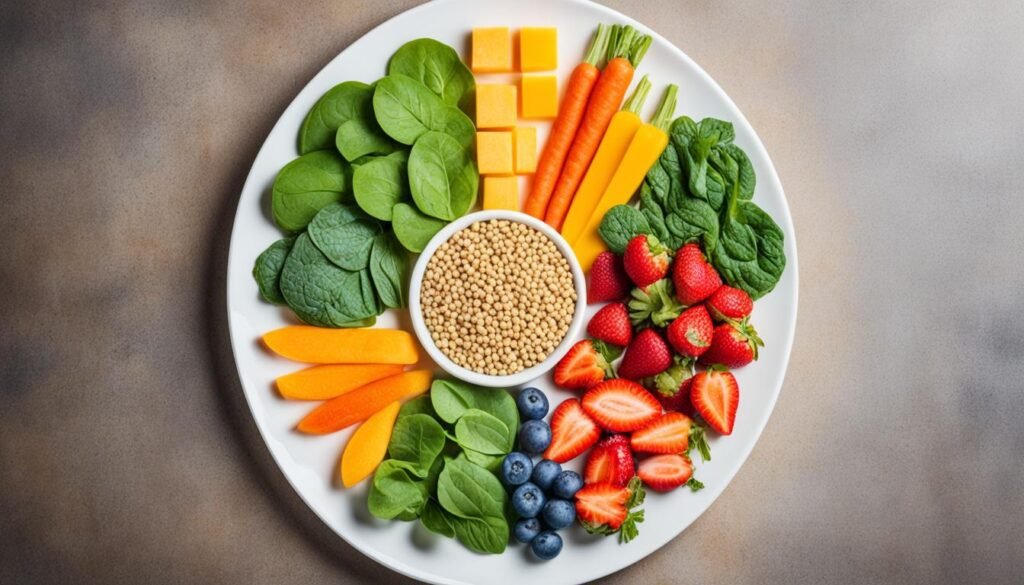
Nutrition plays a vital role in maintaining skin health. A well-balanced diet that includes a variety of nutrients can provide the building blocks needed for healthy skin.
Foods rich in monounsaturated and polyunsaturated fats, omega-3 fatty acids, proteins, and vitamins (like A, C, D, and E) can help support skin health.
Some examples of foods that promote skin health include:
- Fruits
- Vegetables
- Fatty fish
- Eggs
- Flaxseeds
- Legumes
- Avocados
- Extra virgin olive oil
These foods are rich in essential nutrients that contribute to skin health and can help improve the appearance of your skin.
It is important to speak with a healthcare professional to ensure you are getting adequate nutrient intake and to discuss any potential supplementation. They can guide you in creating a healthy and balanced diet plan that caters to your specific skin health needs.
The Role of Supplements in Skin Health
Supplements play a vital role in promoting skin health, especially when there are nutrient deficiencies or inadequate dietary intake. By incorporating supplements into your routine, you can provide your skin with the essential vitamins and minerals it needs to thrive.
One popular category of supplements for skin health is multivitamins. These comprehensive supplements offer a blend of vitamins and minerals, including those specifically beneficial to the skin. By taking a multivitamin, you can ensure that you are getting a diverse range of nutrients that contribute to overall skin health.
Vitamin C supplements are widely known for their benefits in promoting skin health. Vitamin C is a powerful antioxidant that helps protect the skin from free radicals and supports collagen production, leading to improved skin elasticity and a more youthful appearance.
Vitamin D supplements are also important for skin health, especially for those with limited sun exposure. Vitamin D plays a critical role in regulating skin cell growth and repair, and deficiency can lead to skin conditions such as psoriasis and eczema.
Collagen supplements are another popular choice for improving skin health. Collagen is a protein that provides structure and elasticity to the skin, and its production naturally declines with age. Taking collagen supplements can help promote skin firmness and reduce the appearance of wrinkles.
Zinc supplements are beneficial for individuals with acne-prone skin. Zinc plays a role in regulating oil production and immune function, which can help reduce inflammation and prevent breakouts.
When choosing supplements for skin health, it is important to opt for reputable brands that prioritize quality and safety. Additionally, consulting with a healthcare professional is crucial to determine the appropriate dosage and identify any potential interactions with medications.
Summary:
To support your skin health, consider incorporating supplements into your routine. Multivitamins offer a comprehensive blend of essential vitamins and minerals, while vitamin C, vitamin D, collagen, and zinc supplements target specific skin concerns. Choose reputable brands and consult with a healthcare professional to ensure you are taking the appropriate supplements for optimal skin health.
Best Multivitamin for Skin Health
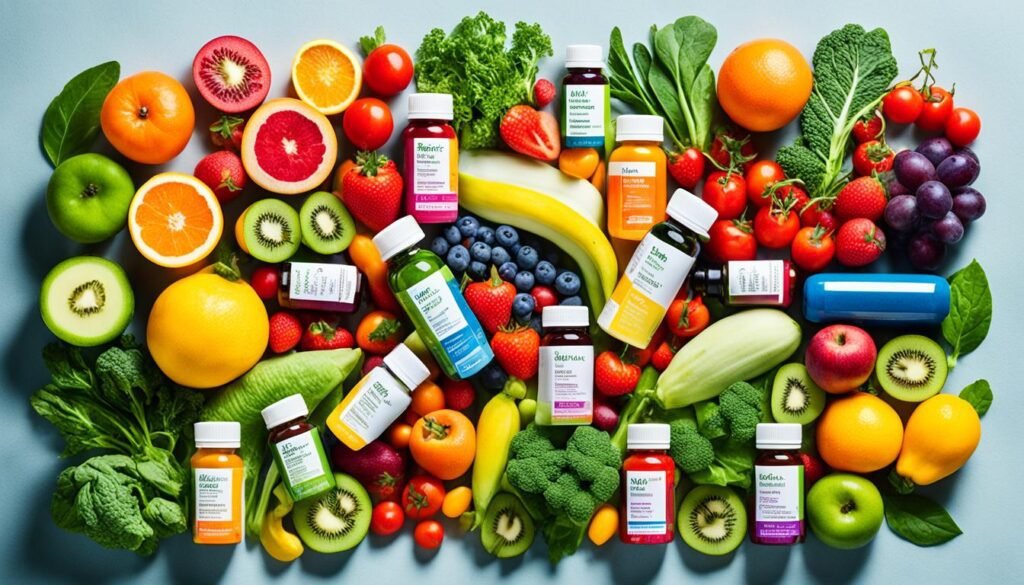
Multivitamins can be a convenient option for ensuring an adequate intake of essential vitamins for skin health. One recommended option is the Nature Made Multivitamin + Omega 3 Gummies. This multivitamin is USP verified and contains key nutrients that promote skin health, including vitamins A, C, D, and E, omega-3s, and zinc.
These gummies are easy to take and come in different versions tailored for different individuals, including men, women, and kids. By incorporating this multivitamin into your daily routine, you can help support your skin’s overall health.
It is important to note that while multivitamins can be beneficial, they should not replace a healthy diet. It is always recommended to prioritize a well-balanced eating plan that includes a variety of nutrient-rich foods. Multivitamins can serve as a supplement to fill nutrient gaps and support skin health.
| Key Nutrients | Amount Per Serving |
|---|---|
| Vitamin A | 4,000 IU |
| Vitamin C | 150 mg |
| Vitamin D | 600 IU |
| Vitamin E | 25 IU |
| Zinc | 5 mg |
Remember, consult with a healthcare professional before starting any new supplements, especially if you have any underlying health conditions or are taking medications that may interact with certain vitamins.
Best Vitamin C Supplement for Skin Health
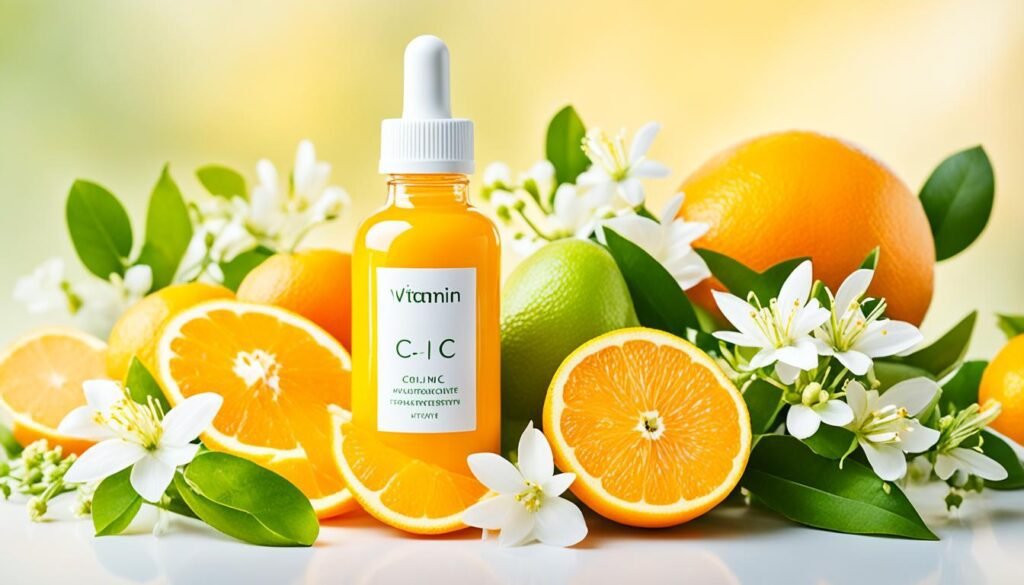
Vitamin C is an important nutrient for maintaining healthy skin. While it can be obtained through your diet, a supplement can be beneficial if your intake is limited. One highly recommended option is the Nature Made Vitamin C 500 mg supplement.
This supplement is USP verified, ensuring its quality and potency. With a potent dose of vitamin C, it provides numerous benefits for skin health. Vitamin C helps promote collagen synthesis, which is essential for maintaining skin elasticity and firmness. It also acts as an antioxidant, protecting the skin against free radicals and UV damage.
The Nature Made Vitamin C 500 mg supplement supports overall skin health by improving skin texture and tone. Additionally, it can help reduce the appearance of dark spots and hyperpigmentation, giving you a more radiant complexion. Regular consumption of this supplement can contribute to a healthier and more vibrant appearance.
It’s important to note that vitamin C supplementation may not be necessary if you already have a sufficient intake through your diet. However, if you feel you need an extra boost or want targeted skin benefits, the Nature Made Vitamin C 500 mg supplement is a reliable choice.
Ensure you consult with a healthcare professional before starting any new supplement regimen to determine the appropriate dosage and ensure it aligns with your individual needs. With the right approach, vitamin C supplementation can enhance your skin health and support your skincare routine.
Best Vitamin D Supplement for Skin Health
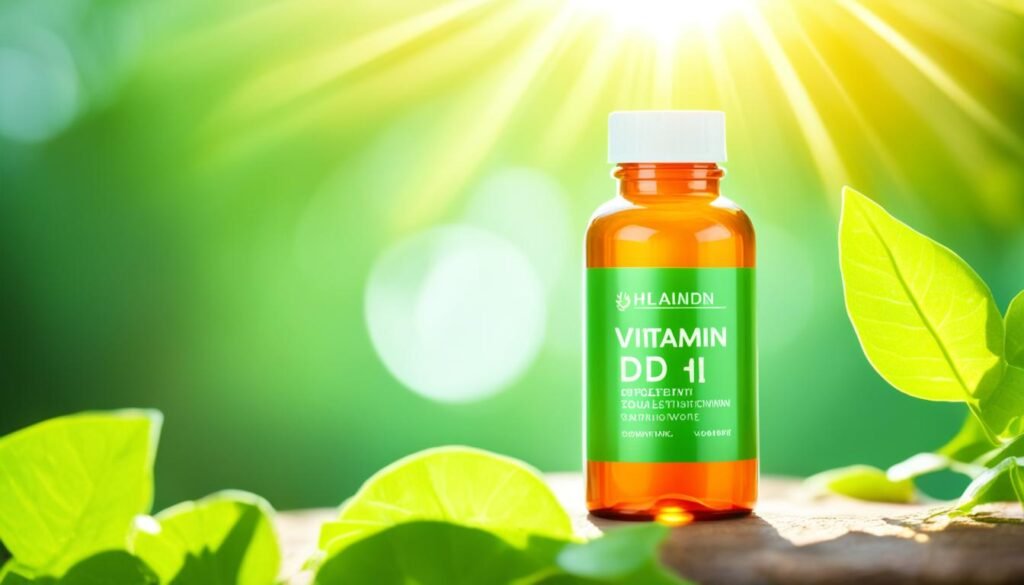
Vitamin D is an essential nutrient for maintaining healthy skin. However, for those with limited sun exposure or deficient in this vitamin, supplementation can be beneficial. One highly recommended option is the Source Naturals Vitamin D-3 Liquid Drops. These drops provide a bioactive form of vitamin D and have undergone third-party testing for quality and potency. By incorporating this supplement into your routine, you can ensure that your skin receives the optimal amount of vitamin D it needs for optimal health.
Consulting with a healthcare professional and getting bloodwork done is essential before beginning any supplement regimen. They can help determine the appropriate dosage based on your individual needs. Additionally, regular monitoring of vitamin D levels is important to ensure that you maintain a healthy balance.
Why Choose Source Naturals Vitamin D-3 Liquid Drops?
Source Naturals Vitamin D-3 Liquid Drops stand out in the market due to several reasons. Firstly, these drops provide a bioactive form of vitamin D, ensuring optimal absorption and utilization by the body. This bioavailability is crucial for reaping the full benefits of vitamin D for skin health.
Secondly, Source Naturals Vitamin D-3 Liquid Drops have been third-party tested for quality and potency. This means that you can trust the product’s claims and be confident that you are getting a high-quality supplement.
Lastly, these liquid drops offer convenience and versatility. They can be easily incorporated into your daily routine, allowing for precise control over dosage. Whether you prefer to take them directly or mix them with a beverage, the liquid form ensures easy administration.
| Features | Benefits |
|---|---|
| Bioactive form of vitamin D | Optimal absorption and utilization |
| Third-party tested | Assured quality and potency |
| Convenient liquid form | Easy dosage control and administration |
With Source Naturals Vitamin D-3 Liquid Drops, you can confidently support your skin health with an effective and reliable vitamin D supplement. Remember to consult with a healthcare professional to determine the appropriate dosage for your specific needs and to monitor your vitamin D levels regularly for optimal results.
Conclusion
Taking care of your skin is crucial for maintaining overall skin health and radiance. Essential vitamins such as vitamin D, vitamin C, vitamin E, and vitamin K play a vital role in achieving healthy and glowing skin. These vitamins can be obtained through a well-balanced diet or by taking supplements.
If you prefer a convenient approach, multivitamins like Nature Made Multivitamin + Omega 3 Gummies can provide a comprehensive blend of essential vitamins for your skin health. These gummies are a great addition to your daily routine and can help ensure that you meet your recommended vitamin intake.
For specific skin concerns, targeted supplements like vitamin C and vitamin D can be beneficial. Vitamin C supplements can enhance collagen synthesis and protect the skin from free radicals and UV damage. On the other hand, vitamin D supplements can compensate for limited sun exposure or deficiencies, promoting overall skin health.
However, it is always recommended to consult with a healthcare professional to determine the best approach for your individual needs. They can provide personalized advice, recommend the appropriate dosage, and ensure the safety and efficacy of any supplements you may consider.
FAQ
What are the best essential vitamins for skin health?
The best essential vitamins for skin health are vitamin D, vitamin C, vitamin E, and vitamin K.
How do these vitamins contribute to healthy skin?
These vitamins help reduce dark spots, redness, wrinkles, rough patches, and excessive dryness. They also protect the skin from damage and aid in healing.
How can I obtain these vitamins?
You can obtain these vitamins through supplements or by using skincare products that contain them. You can also get vitamin D through sunlight exposure and vitamin C, E, and K through a well-balanced diet.
What are the recommended daily intakes for these vitamins?
The recommended daily intake is 600 IU of vitamin D, 75-120 mg of vitamin C, 15 mg of vitamin E, and 90-120 ug of vitamin K.
What is the importance of vitamin D for skin health?
Vitamin D plays a role in skin tone and may help treat skin conditions like psoriasis. It is primarily produced when sunlight is absorbed by the skin, but it can also be obtained through fortified foods and foods high in vitamin D.
What are the benefits of vitamin C for skin health?
Vitamin C is important for collagen production and has antioxidant properties. It helps keep the skin healthy, protected from UV damage, and promotes wound healing.
What is the role of vitamin E in skin health?
Vitamin E is an antioxidant that protects the skin from sun damage and helps prevent dryness. It is produced through sebum and can be obtained through nuts, seeds, and supplements.
What is the importance of vitamin K for skin health?
Vitamin K plays a crucial role in blood clotting, wound healing, and the treatment of certain skin conditions such as stretch marks and dark spots. It can be obtained through leafy greens and vegetables.
What are the effects of vitamin deficiencies on skin health?
Deficiencies in vitamins C and E can increase the risk of skin damage, including skin cancer. It is important to maintain adequate intake of these vitamins to support skin health.
How does nutrition affect skin health?
A well-balanced diet that includes a variety of nutrients can provide the building blocks needed for healthy skin. Fruits, vegetables, fatty fish, eggs, and legumes are examples of foods that promote skin health.
Are supplements beneficial for skin health?
Supplements can be beneficial for skin health, especially when nutrient deficiencies are present or dietary intake is not sufficient. Multivitamins and specific vitamin supplements like vitamin C and D can support overall skin health.
What is the best multivitamin for skin health?
The Nature Made Multivitamin + Omega 3 Gummies is a recommended option as it contains key nutrients for skin health, including vitamins A, C, D, and E, omega-3s, and zinc.
What is the best vitamin C supplement for skin health?
The Nature Made Vitamin C 500 mg is a recommended supplement as it provides a potent dose of vitamin C, which promotes collagen synthesis, protects against free radicals and UV damage, and supports overall skin health.
What is the best vitamin D supplement for skin health?
The Source Naturals Vitamin D-3 Liquid Drops is a recommended supplement as it provides a bioactive form of vitamin D. Consult with a healthcare professional to determine an appropriate dosage for vitamin D supplementation.


